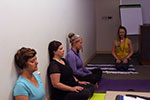Mindfulness for School Counselors
Erin Leach, M.Ed., knows a little something about the stress experienced by educators.
She began her career as a first grade teacher. After graduating from Loyola’s Master's in School Counseling program, she returned to her school as a counselor and worked for another six years. She was the only school counselor in a population of approximately 600 students.
“School counselors have very big jobs,” she explains, noting that she might meet with students and parents, sit in on team meetings, and teach three to four lessons, all in one day. “I came home feeling drained, like someone took a straw and sucked the life out of me.”
It’s often called “Compassion Burnout,” the emotional and physical toll taken on those in helping professions. The problem is acute among educators. An American Federation of Teachers quality of life survey found that 61% of educators felt frequent stress and that this caused a decline in job satisfaction over time. Those who experienced stress were more likely to leave work physical and mentally exhausted. Educators face many stressors and analysis has shown they work more overtime than other professions. Some call burnout in education an epidemic.
Thankfully, there is help and it begins with a simple act of compassionate self-care: mindfulness.
Mindfulness can be defined as paying attention to something in a sustained and non-judgmental way, Leach states. A basic practice, for example, is to sit quietly and pay attention to your breath. After a few minutes people tend to get distracted. Without judging that distraction as “failure,” you simply return to the breath.
“Mindfulness completely transformed my life,” says Leach. “Most transformational for me was that rather than being reactionary in stressful situations I could step back and formulate a response instead of always snapping to a response.”
Leach, who is also a certified yoga instructor, is teaching as an affiliate professor, offering two courses on mindfulness for school counselors:
The courses are flexible, designed to be taken in any order. While the coursework offers insights for school counselors on how to create and implement mindfulness programs in their school, much of the course work is designed is to give counselors the tools they need to promote their own social-emotional development and personal wellness.
Like a guardian who must apply an oxygen mask to herself on an airplane before applying one to a child, by teaching counselors how to benefit from mindfulness they enter the classroom ready to bring their best self to the job. Self-care like this is so important, the ASCA Ethical Standards for School Counselors mandates counselors self-assess their wellbeing to keep from burnout.
It seems simple, but this practice has been linked to improved emotional regulation. That correlates to lower stress. Many of us go through our days with the constant strain of mental chatter, always thinking of the next “to do” list item and the many demands on our multiple plates. We’re always ready to leap at something in a reactionary way. Mindfulness quiets the chatter and focuses attention in the now.
“It’s easy to feel scattered; mindfulness helps you remain grounded,” Leach explains, adding that when she began practicing she felt less tired and had more energy. “It also helps deal with that feeling of being overwhelmed so you can approach your job in a manageable, piece by piece fashion.”
Mindfulness has many benefits including:
- Reduced stress
- Increased clarity
- Better job performance
- Greater self-compassion
- Improved emotional regulation
- Some research states that not only can a mindfulness practice strengthen areas of the brain responsible for attention, emotional control, and problem solving, it may permanently change the brain’s structure.
The courses offered by Loyola will be hands-on, including instruction into mindful meditation, movement, and eating. Participants will leave with tangible tools, too, like meditation jars and movement sequences designed for all age groups so counselors can implement the practices they’ve learned with their students. When mindfulness is integrated into the classroom it has been linked to improved student focus and engagement as well as increased compassion and lower anxiety.
With a few straightforward tools, mindfulness can transform everything.
“I practice mindfulness meditation so I can translate it to the rest of my life,” Leach explains. “You can eat mindfully or wash dishes with mindfulness. The idea is to be aware of the present, to realize when you’ve left the present and to bring your attention back.”
Leach says that once school counselors feel better, less overwhelmed, “I hope they will feel reinvigorate as they go into their school year.”
She adds: “Once they see the benefit for themselves, they’ll want to teach it to kids.”
To get started on your journey of self-care today check out Loyola University’s School Counseling courses or visit the Loyola Counseling Center page for tips and tricks on self-care and relaxation, how to meditate, and more.
###